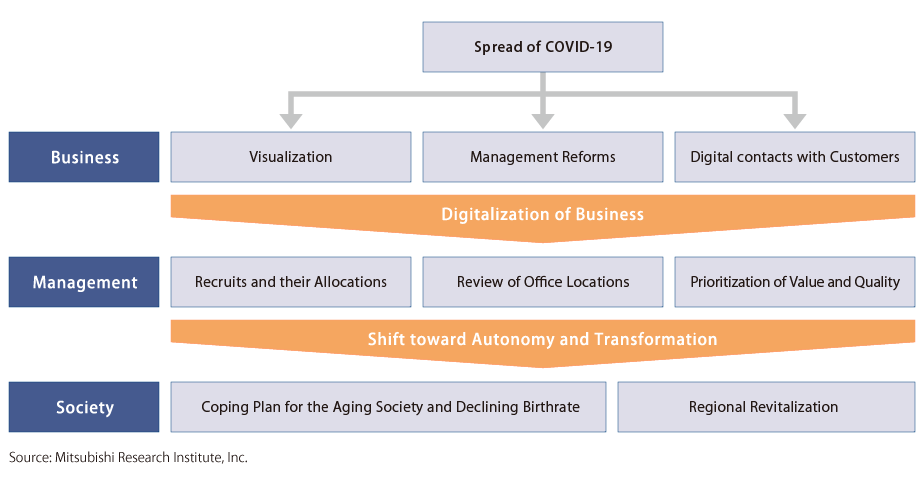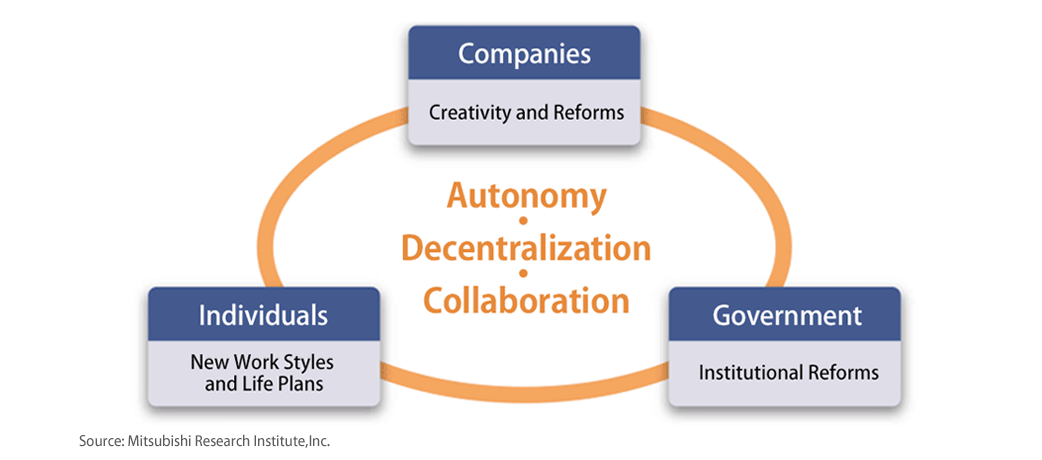With the spread of COVID-19, we have witnessed a rapid and somewhat compulsory progress in the use of telework as part of our daily lives. As a result, both employees and companies have come to appreciate its benefits that include being free from rush hour congestion and the issue of having to secure meeting rooms in the office. While we have also seen some management challenges in communication, supervision and so on, if we can handle these challenges, telework will become an integral part of our new normal lives.
The secondary merit of telework is that it greatly contributes to digitalizing and streamlining work. We can identify uneven distribution of work or unnecessary tasks by accumulating and visualizing data on daily operations and employees’ actions, from which we examine and optimize them. By accumulating data on sales, internal meetings and other non-routine tasks, beyond simply streamlining routine work, we can advance business reforms in all areas of work within a company and improve productivity.
As digitalization proceeds, the day-to-day middle managers’ work, such as approval procedures unique to Japan is likely to disappear. The ability to yield results will become more important than managing supervisees. Mid-level managers will have to play roles of leaders and advisors who can clearly explain an organization’s policies and allow junior employees to work comfortably and grow. Reforming the roles of mid-level managers while training and developing their ability will be a new challenge for business executives in this new era.
Business changes have been seen in the way companies contact their customers. More importance has been placed on digital contacts with customers on the Internet. Only the necessary parts will be physically done in the real world where higher quality than before will be expected. For example, on fashion e-commerce sites, only physical measurements and fitting will be done at brick-and-mortar stores when customers visit. The clothes that match customers’ tastes will be ready at these stores prior to their arrivals based on online information. Combining digital information with actual customer services in real stores will provide higher customer value than before (Figure 1).
The secondary merit of telework is that it greatly contributes to digitalizing and streamlining work. We can identify uneven distribution of work or unnecessary tasks by accumulating and visualizing data on daily operations and employees’ actions, from which we examine and optimize them. By accumulating data on sales, internal meetings and other non-routine tasks, beyond simply streamlining routine work, we can advance business reforms in all areas of work within a company and improve productivity.
As digitalization proceeds, the day-to-day middle managers’ work, such as approval procedures unique to Japan is likely to disappear. The ability to yield results will become more important than managing supervisees. Mid-level managers will have to play roles of leaders and advisors who can clearly explain an organization’s policies and allow junior employees to work comfortably and grow. Reforming the roles of mid-level managers while training and developing their ability will be a new challenge for business executives in this new era.
Business changes have been seen in the way companies contact their customers. More importance has been placed on digital contacts with customers on the Internet. Only the necessary parts will be physically done in the real world where higher quality than before will be expected. For example, on fashion e-commerce sites, only physical measurements and fitting will be done at brick-and-mortar stores when customers visit. The clothes that match customers’ tastes will be ready at these stores prior to their arrivals based on online information. Combining digital information with actual customer services in real stores will provide higher customer value than before (Figure 1).
Figure 1: Business Reforms leading to Social Transformation


